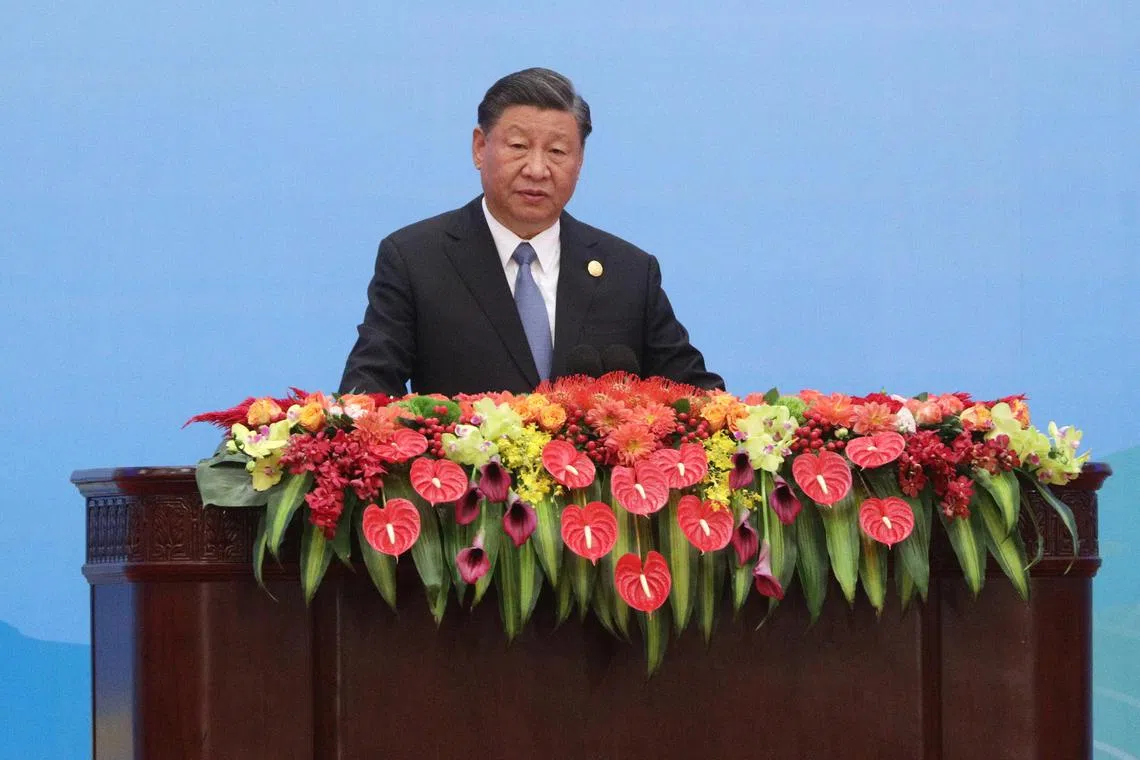China’s Xi warns against decoupling, lauds Belt and Road at forum
Sign up now: Get insights on Asia's fast-moving developments

Chinese President Xi Jinping speaking at the opening ceremony of the Belt and Road Forum at the Great Hall of the People in Beijing, on Oct 18.
PHOTO: EPA-EFE
BEIJING – Chinese President Xi Jinping warned against decoupling from China as he opened the Belt and Road Initiative (BRI) forum
Mr Xi also lauded his grand plan launched 10 years ago of building global infrastructure and energy networks connecting Asia with Africa and Europe through overland and maritime routes, saying that “blueprints turned into real projects”.
Chinese Foreign Minister Wang Yi told reporters that US$97.2 billion (S$133.2 billion) worth of business contracts was signed at the forum, which ended on Wednesday.
Representatives of more than 130 countries, largely from the Global South, attended the forum, including several heads of state, of whom the most prominent was Mr Xi’s “dear friend”, Russian President Vladimir Putin.
“We stand against unilateral sanctions, economic coercion, decoupling and supply chain disruption,” Mr Xi told more than 1,000 delegates gathered in an ornate conference room in the Great Hall of the People, west of Tiananmen Square.
Mr Putin and other foreign leaders sat with key Chinese officials from the 25-member Politburo in the front row, as Mr Xi delivered his opening remarks.
Mr Xi pushed against Western efforts to reduce dependence on the Chinese economy, saying: “Our lives will not be better and our development will not be faster if we view the development of others as a threat, and economic interdependence as a risk.”
Western leaders insist that their goal is to “derisk”, not “decouple”, from China,
China’s threats to Taiwan and the trade disruptions of the pandemic years have added urgency to the desire to limit dependence on China.
Although the BRI at first set out to connect China to Western Europe, senior European Union figures were missing.
The sole head of state from the bloc present was Hungary’s populist Prime Minister Viktor Orban.
Other notable attendees included the Afghan Taliban administration’s commerce minister Nooruddin Azizi.
“China has more interest right now in developing Afghanistan at this moment, so we are more engaged with China. The Chinese have more interest in economic affairs, that’s why we’re here,” Mr Azizi told reporters at the ceremony.
Western scepticism
Western scepticism of Mr Xi’s grand plans stems from suspicions over the way it would extend China’s global influence, analysts said.
China has at times bristled at criticism of the BRI, saying it carries anti-Chinese prejudice and a wish to contain its rise, while overlooking what it says are genuine good intentions.
Analysts have also said some of China’s infrastructure lending through the project has saddled poor countries with loans they cannot repay.
Indonesian President Joko Widodo, whose country owes China more than US$20 billion, emphasised in a speech that BRI projects “must not complicate (countries’) fiscal conditions”.
In an address that followed Mr Xi’s, Mr Putin praised the BRI
Several European officials left the hall as Mr Putin took the stage.
During a three-hour meeting on the sidelines of the conference, Mr Xi told Mr Putin that both sides should explore cooperation in strategic emerging industries and deepen regional cooperation.
“China hopes that the China-Mongolia-Russia natural gas pipeline project will make substantive progress as soon as possible,” Mr Xi said, according to a state media readout. Both leaders also had in-depth discussions on the Middle East conflict, state broadcaster CCTV reported without giving further details.
Mr Xi is making the Belt and Road smaller and greener,
The aim is to aid a broader push for a world order that is multipolar and gives the Global South more agency, rather than one dominated by Washington and its allies, analysts say.
The BRI has also become more focused on issues such as climate change and artificial intelligence (AI), as Mr Xi seeks to use it to export Chinese ideas about governance and build consensus around Chinese norms and its development model, analysts say.
On Wednesday, Mr Xi reinforced those trends, pledging to deepen cooperation in green infrastructure, energy and transportation, and put forward a global initiative for AI governance.
After his speech, China’s Foreign Ministry said the country would push to create a United Nations body to regulate AI.
It added that Beijing opposes “malicious obstructing” of other countries’ AI development, likely a reference to United States President Joe Biden’s administration’s efforts to block export of advanced AI chips to China.A European business representative, who did not want to be named for sensitivity reasons, said on the sidelines of the ceremony that the BRI was “creating impact for some of the countries involved” and that “I think there is some truth to some of the speeches about improving livelihood and connectivity”. REUTERS


